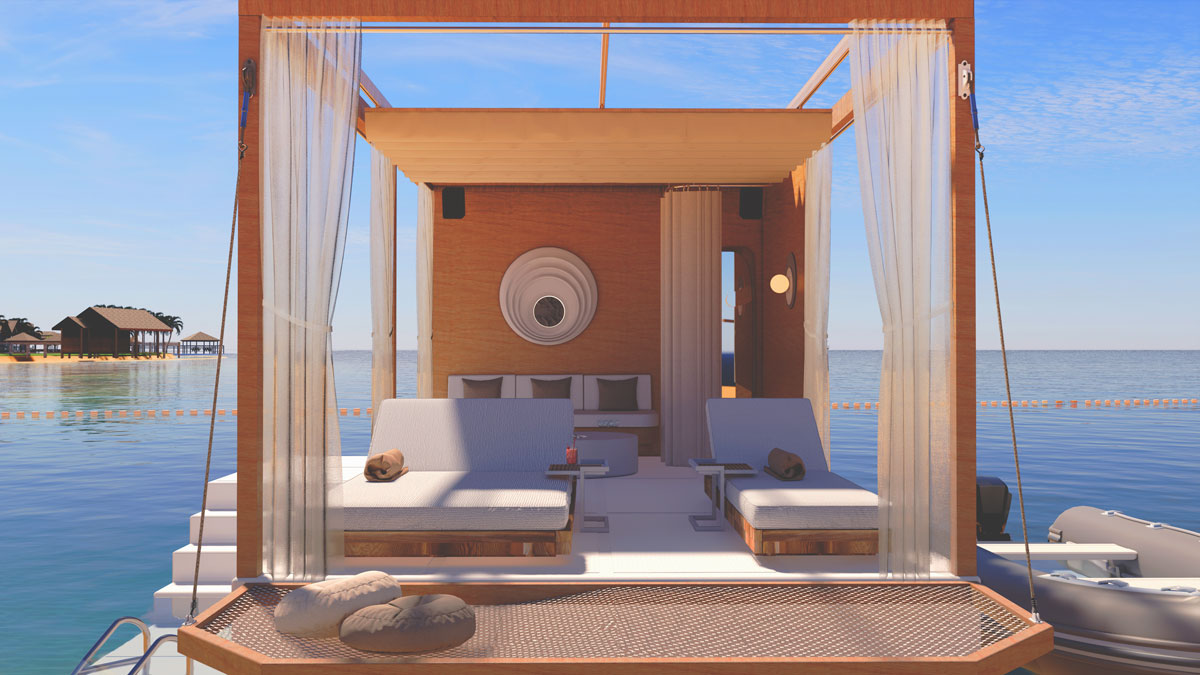
Beach holidays are no longer limited to the traditional trio of sea, sand, and sun. Today’s travelers crave unique experiences that blend relaxation with innovation. Enter the Floating Lounge, an innovative addition to waterfront properties [...]
Humanity has had a complex relationship with water since its existence. Water, which was previously needed only for the continuation of existence, has gained cultural, sociological and psychological importance over the centuries. This relationship, which is constantly changing with water, appears in different forms throughout history. Starting from science fiction novels and extending to the first floating structures, this adventure seems ready to embark on many different adventures with the changing world conditions and developing technology.

It was created with the Artificial Intelligence Dall-E using the words “Future Cities on Water”.
From the first civilizations to the present day, societies on the waterfront have built on cities and created their own water cultures. The coastal phenomenon, which has not lost its importance from the past to the present, still constitutes the most civilized parts of the land today.
According to the data published by the United Nations Population Fund in 2010, 21 of the 25 large and densely populated cities were established on the shores of rivers, seas and oceans. Although it varies according to the region, it is seen that 84% of the population density is clustered in coastal regions in the relationship between water and land.
This dependence of societies on water has brought disadvantages along with the passing time and changing world conditions. An example is the rise of waters due to climate change, and as a result, coastal cities will be affected first. According to the data obtained, an increase in temperatures by 1°C causes a one meter increase in water levels.
As the majority of settlement is concentrated in coastal areas, it is estimated that by 2050, 90% of major cities will be heavily affected by rising waters.
One of the biggest reasons why the tendency to water will increase in the near future is; coastal areas are very limited compared to the general land area, and in this context, coastal areas are exposed to intense and unplanned urbanization.
At this point, the coastal area that can be settled on the world has decreased almost to the point of non-existence. However, since people could not break away from the idea of water civilization, in the face of all these negativities, they moved away from the idea of creating a land-dependent water culture and sought an independent life on the water.

It was created with the Artificial Intelligence Dall-E using the words "Floating Houses on Water".
Starting from the need to living on the water, people have built floating houses on water in different ways from past to present. Dating back hundreds of years, floating houses have been seen throughout history in countries such as South Korea, Cambodia, Vietnam, Thailand, Indonesia, and China.
It can be said that the people, who are exposed to frequent floods in the region that receives heavy rainfall, have stopped fighting with water and have chosen to live with it. While the floating habitats in Cambodia may look like normal houses, China's floating villages are mostly made up of small boats. In Europe, there are examples of floating life first seen in the Netherlands since the 7th century.
After the Second World War, with the changing world order and new developments, new searches on water emerged. After the residences, it was aimed to design public spaces and mega-structures on the water. Influenced by the developing shipbuilding technologies, the architects made architectural and urban design studies to offer new life opportunities in the ocean area.
The first floating city project was shown at the Okinawa International Ocean Exhibition in 1971. In addition to floating city projects, this exhibition also includes different mega-structures such as floating airports and oil stocks.

It was created with the Artificial Intelligence Dall-E using the words "Floating Cities of the Future".
Today, modern floating cities are being designed, where people living can continue their daily lives comfortably and which include basic social needs solutions such as working and having fun. It is talked about that these cities should be completely independent from the land, produce their own energy, separate their wastes and even have their own legal order. In these cities, different life identities will emerge from the land, and perhaps for the first time in the world, cultures and civilizations developed only in water will emerge.
Floating cities, which are seen to have an important place in the future of humanity, make us think that they can easily adapt to the same future. Global warming and rising seas are a major threat to coastal communities. These floating cities, which are naturally immune to natural disasters such as floods, fires and earthquakes, offer a more livable environment for humanity with their climate adaptation.
In addition, it can be said that it will be one step ahead of land cities in keeping up with the times with its changeable, portable, articulated and expandable structures.
It is obvious that this new life on water will bring along many architectural, technical, cultural and social questions. Despite all this, floating communities, which are a new type of life in water, and a new aquatic culture that will emerge with it are not in the distant future for humanity. Mankind, who has completed the exploration of the land, is waiting on the shores of the oceans to step into a completely different world with brand new ideas.